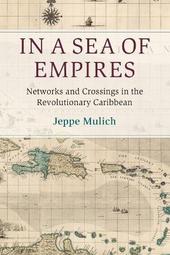
|
In a Sea of Empires: Networks and Crossings in the Revolutionary Caribbean
Paperback / softback
Main Details
| Title |
In a Sea of Empires: Networks and Crossings in the Revolutionary Caribbean
|
| Authors and Contributors |
By (author) Jeppe Mulich
|
| Series | Cambridge Oceanic Histories |
|---|
| Physical Properties |
| Format:Paperback / softback | | Pages:216 | | Dimensions(mm): Height 229,Width 152 |
|
| Category/Genre | World history |
|---|
| ISBN/Barcode |
9781108747479
|
| Classifications | Dewey:972.97 |
|---|
| Audience | | Professional & Vocational | |
|---|
| Illustrations |
Worked examples or Exercises
|
|
Publishing Details |
| Publisher |
Cambridge University Press
|
| Imprint |
Cambridge University Press
|
| Publication Date |
20 October 2022 |
| Publication Country |
United Kingdom
|
Description
At the turn of the nineteenth century, the Caribbean was rife with revolutionary fervor and political turmoil. Yet, with such upheaval came unparalleled opportunities. In this innovative and richly detailed study, Jeppe Mulich explores the interconnected nature of imperial politics and colonial law in the maritime borderlands of the Leeward Islands, where British, Danish, Dutch, French, Spanish, and Swedish colonies both competed and cooperated with one another. By exploring the transnational networks involved in trade, slavery, smuggling, privateering, and marronage, he offers a new account of the age of revolutions in the Caribbean, emphasizing the border-crossing nature of life in the region. By approaching major shifts in politics, economy, and law from the bottom-up, a new story of early nineteenth-century globalization emerges - one that emphasizes regional integration and a multiplicity of intersecting networks.
Author Biography
Jeppe Mulich is Teaching Associate in Global History at the University of Cambridge and St John's College.
Reviews'Through its examination of illicit trade, privateering and slave trading in the Leeward Islands, this book uncovers hitherto unstudied trans-imperial networks, intercolonial relations and inter-imperial politics. Its exploration of the role of small powers - particularly the long-neglected Scandinavian empires - will be of particular interest to scholars of historical sociology and global and imperial history.' Lisa Ford, University of New South Wales 'In a refreshing take on global history, Jeppe Mulich makes a convincing case for 'microregional' networks as building blocks for globalization. His study of one such network - the Caribbean Leeward Islands - shows how integration came about through numerous local initiatives from actors across the social spectrum and across imperial borders.' Wim Klooster, Clark University 'This is a fascinating contribution to current debates on the dialogue between microhistory and global history. By adopting a microregional lens, which puts the Swedish and Danish Caribbean islands centre stage while paying attention to transnational and inter-imperial exchanges, Mulich offers a genuinely fresh perspective on the first age of global imperialism.' Renaud Morieux, University of Cambridge 'This insightful global work reminds readers of the Danish, Dutch, and Swedish imperial presence in this part of the Caribbean as power tilted toward British hegemony by 1850 ... This notable work is worth examination by established and emerging scholars alike.' M. D. Davis, Choice '... In a Sea of Empires presents a meticulously researched reimaging of the ties that bound the colonial Leeward Islands to a shared identity that transcended as well as at times defied national ties to the metropole. Mulich's microregional approach not only proves effective within its own context, but also establishes a model for new modes of colonial and imperial historical research.' Christopher Marshall, The Middle Ground Journal 'Informed by an impressive range of Danish, Swedish, French, and English language sources scattered across Europe, the Caribbean, and the United States, In a Sea of Empires will be of interest to scholars in the field of Caribbean history and well beyond. Through his case study of the Leeward Islands, Mulich convincingly uses a little-studied region to offer afresh perspective on how early globalization was enacted on the ground and at sea.' Tessa Murphy, Hispanic American Historical Review 'This well-crafted book will be of particular interest to people working on other micro-regions in the world. The book, and especially the introduction and conclusion, offers a theoretical framework of analysis around inter-imperial interactions that will lead to more fruitful historical exploration.' Vanessa Mongey, H-Net Reviews
|